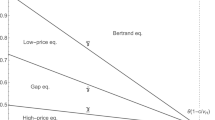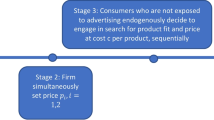Summary. We report an experiment designed to investigate markets with consumer search costs. In markets where buyers are matched with one seller at a time, sellers are predicted to sell at prices equal to buyers' valuations. However, we find sellers post prices that offer a more equal division of the surplus, and these prices tend to be accepted, while prices closer to the equilibrium prediction are rejected. At the other extreme, sellers are predicted to sell at a price equal to marginal cost when buyers are matched with two sellers at a time. Here, we find prices are closer to, but still significantly different from, the equilibrium prediction. Thus, our results support theoretical comparative static, but not point, predictions.
Similar content being viewed by others
Author information
Authors and Affiliations
Additional information
Received: January 10, 1998; revised version: July 24, 1999
Rights and permissions
About this article
Cite this article
Abrams, E., Sefton, M. & Yavas, A. An experimental comparison of two search models. Econ Theory 16, 735–749 (2000). https://doi.org/10.1007/PL00020950
Issue Date:
DOI: https://doi.org/10.1007/PL00020950




